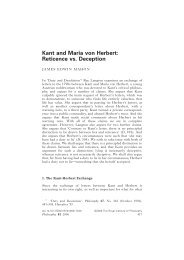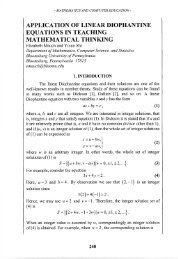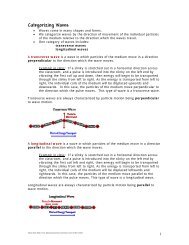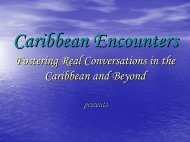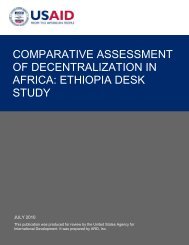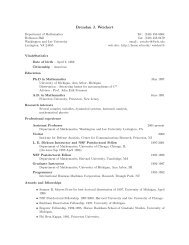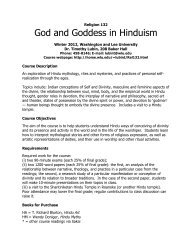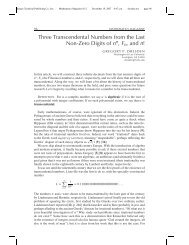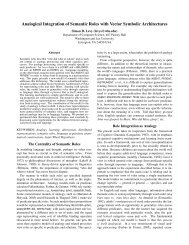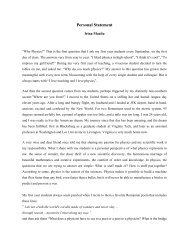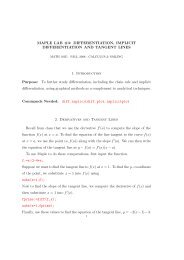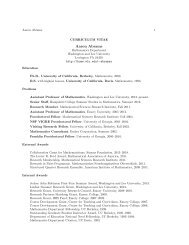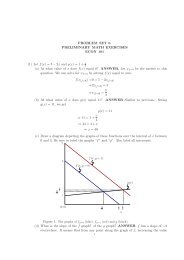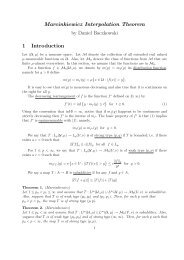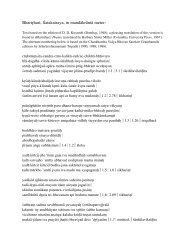What Evolves?
What Evolves?
What Evolves?
Create successful ePaper yourself
Turn your PDF publications into a flip-book with our unique Google optimized e-Paper software.
Language, Nature, Nurture<br />
Part II: <strong>What</strong> <strong>Evolves</strong>?<br />
Simon D. Levy<br />
PHIL 205<br />
07 November 2007
Outline<br />
• Exaptation (Chomsky, Gould)<br />
• Adaptation (Pinker & Bloom)<br />
• Culture (Kirby)<br />
• It’s all about recursion (Hauser,<br />
Chomsky, Fitch)<br />
• No it’s not (Everett)<br />
• The current mess
S’More Data<br />
• Elmo stole a cookie.<br />
• Ernie stole a car.<br />
• Who stole a cookie?<br />
• Ernie stole WHAT?<br />
• <strong>What</strong> did Elmo steal?<br />
• Who stole what?<br />
• <strong>What</strong> did who steal? (Normal intonation)
Story #1: Biological Evolution,<br />
Non-Adaptive<br />
a.k.a. Exaptation,<br />
a.k.a. S*** Happens
By and large, those who held that<br />
selection played a major role in<br />
evolution were English country<br />
gentlemen, but...those who were not<br />
have largely been urban Jews.<br />
- John Maynard Smith (attributed)
The Spandrels of San Marcos<br />
(Gould & Lewontin 1979)
Language as a Spandrel<br />
<strong>What</strong> about language, the most common denominator and<br />
distinguishing factor of humanity? And I don't mean using sound<br />
or gesture for communication, as many complex animals do. I<br />
refer to the unique syntax and underlying universal grammar of all<br />
languages. I can't prove that language was not the selected basis<br />
of increasing brain size, but the universals of languages are so<br />
different from anything else in nature, and so quirky in their<br />
structure, that origin as a side consequence of the brain’s<br />
enhanced capacity, rather than as simple advance in continuity<br />
from ancestral grunts and gestures, seems indicated. (I lay no<br />
claim to originality for this argument about language. The<br />
reasoning follows directly as an evolutionary reading for Noam<br />
Chomsky's theory of universal grammar.)<br />
Gould, S.J. (1993) Eight Little Piggies: Reflections in Natural History.<br />
New York: W.W. Norton & Company. p. 321.
The Selfish Gene Hypothesis<br />
(Dawkins)
Why All the Fuss about<br />
Adaptation?
Who’s Yer Daddy-Truck !
Story #2: Biological Evolution,<br />
Adaptive<br />
a.k.a. Selection,<br />
a.k.a. Good S*** Happens
Pinker & Bloom (1990) on<br />
Gould<br />
• “Putting a dome on top of four arches<br />
gives you a spandrel, but it does not give<br />
you an evangelist.”<br />
• “[T]he only way for complex design to<br />
evolve is through a sequence of<br />
mutations with small effects”.
Pinker & Bloom (1990) on<br />
Adaptation in Language<br />
• Essential idea: Language has evolved for<br />
the communication of propositional<br />
structure over a serial channel<br />
• C.f. Hockett 1960:<br />
http://www.people.ex.ac.uk/bosthaus/Lecture/hockett1.htm#Vocal-auditory%20channel
Adaptation in Language<br />
• So a lot of these “arbitrary” features<br />
may actually be adaptive for serial<br />
communication<br />
• E.g., avoid “garden paths”:
Adaptation in Language<br />
• So a lot of these “arbitrary” features<br />
may actually be adaptive for serial<br />
communication<br />
• E.g., avoid “garden paths” :<br />
The
Adaptation in Language<br />
• So a lot of these “arbitrary” features<br />
may actually be adaptive for serial<br />
communication<br />
• E.g., avoid “garden paths” :<br />
The horse
Adaptation in Language<br />
• So a lot of these “arbitrary” features<br />
may actually be adaptive for serial<br />
communication<br />
• E.g., avoid “garden paths” :<br />
The horse raced
Adaptation in Language<br />
• So a lot of these “arbitrary” features<br />
may actually be adaptive for serial<br />
communication<br />
• E.g., avoid “garden paths” :<br />
The horse raced past
Adaptation in Language<br />
• So a lot of these “arbitrary” features<br />
may actually be adaptive for serial<br />
communication<br />
• E.g., avoid “garden paths” :<br />
The horse raced past the
Adaptation in Language<br />
• So a lot of these “arbitrary” features<br />
may actually be adaptive for serial<br />
communication<br />
• E.g., avoid “garden paths” :<br />
The horse raced past the barn
Adaptation in Language<br />
• So a lot of these “arbitrary” features<br />
may actually be adaptive for serial<br />
communication<br />
• E.g., avoid “garden paths” :<br />
The horse raced past the barn fell.
Defeating Other Spandrel<br />
Arguments<br />
• Diversity: lots of variety in how the<br />
same things are expressed (word order,<br />
noun endings, etc.)<br />
• “[S]urface diversity is often a<br />
manifestation of minor differences in<br />
the underlying mental grammars.”
Defeating Other Spandrel<br />
Arguments<br />
• Arbitrariness: having “island<br />
constraints” doesn’t help you evolve!<br />
• “No adaptive organ can be adaptive in<br />
every aspect, because there are as many<br />
aspects of an organ as there are ways<br />
of describing it.”
Pinker & Bloom: Conclusions<br />
“[L]anguage shows signs of complex design<br />
for the communication of propositional<br />
structures, and the only explanation for<br />
the origin of organs with complex design<br />
is the process of natural selection.”
Story #3: Iterated Learning<br />
a.k.a. Culture,<br />
a.k.a. I Can’t Remember All<br />
This S***
Let’s Play Telephone!
Kirby (2002): Syntax Without<br />
Natural Selection<br />
• Simulated, non-selective evolution of<br />
languages (vs. brains)<br />
• Bare-bones learning<br />
– One teacher, one learner<br />
– First time through, teacher has a random grammar<br />
– Repeat a “training session” some number of times<br />
(e.g., 5000)<br />
– No explicit fitness of individuals or languages<br />
– At end of session, teacher dies, and learner<br />
becomes new teacher
Kirby (2002): Syntax Without<br />
Natural Selection<br />
• Each training session: repeat some<br />
number of times<br />
– Teacher picks a meaning like<br />
LOVES(BILL, MARY)<br />
- Teacher uses (initially random) grammar to<br />
generate a sequence of symbols for the<br />
meaning<br />
- Both teacher & learner modify their<br />
grammars to accommodate the new<br />
meaning/sequence pair
Kirby (2002): Results<br />
• First generation: no regular mappings between<br />
meaning and form:<br />
– LOVES(JOHN, MARY) : aklbk<br />
– LOVES(MARY, FRED): p<br />
• Final generation: language-like mappings:<br />
– LOVES(JOHN, MARY): aebc<br />
– LOVES(MARY, JOHN): baec
Kirby (2002): Conclusions<br />
• Interesting syntax (compositionality,<br />
systematicity, recursion) can emerge without<br />
natural selection, if there’s a communication<br />
bottleneck.<br />
• Opens up a big new field: experimental<br />
language learning<br />
• Current work (LEC): human subjects inventing<br />
languages in language games.
Hauser, Chomsky, & Fitch<br />
(2002): It’s All About<br />
Recursion
Hauser, Chomsky, & Fitch<br />
(2002)<br />
• Faculty of Language, Broad sense:<br />
communicating ideas over a serial<br />
channel<br />
– Lots of animals<br />
• Faculty of Language, Narrow sense:<br />
recursion<br />
– By which we really mean, MERGE, by which<br />
we mean, compositionality<br />
– Humans, necessarily & sufficiently
Everett (2005): Not So Fast!
Cultural Constraints on<br />
Grammar and Cognition in<br />
Pirahã (Everett 2005)
Pirahã People<br />
• Remnant of Mura tribe (late<br />
1700’s)<br />
• 150-200 hunter-gatherers<br />
• Trade and reproduce with<br />
outsiders, but no interest in<br />
outsider language or culture
Pirahã Language:<br />
• No color terms<br />
• No counting words<br />
• No recursion:<br />
I saw the guy who stole your canoe.<br />
A guy stole your canoe. I saw him.<br />
• Huge debate: A finite human language?
The Current Mess<br />
• Pinker & Bloom vs. Gould, Chomsky<br />
• Everett vs. Chomsky, Pinker et al.<br />
• Everett vs. Nevins, Pesetsky, & Rodriguez<br />
• Gordon (New Yorker 2007) vs. Everett:<br />
Pirahã are not a bunch of retarded,<br />
inbred hillbillies<br />
• Gordon (New Yorker, part deux): I<br />
apologize to the Appalachian community<br />
(?!)<br />
• Come see Everett here in January



